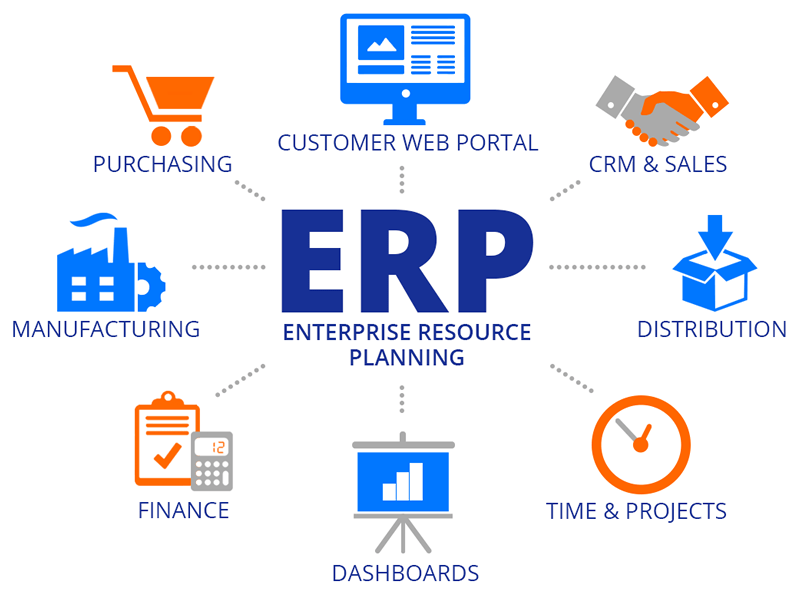
How ERPNext is integrated into different workflows and Industries
ERPNext is cloud-based enterprise resource planning (ERP) software that facilitates the management of a company’s finances, supply chain, projects, and more. It’s flexible enough to be incorporated into a wide range of existing workflows inside an organisation, all with the aim of making those processes more streamlined and effective. ERPNext’s adaptability and customization make it suitable for usage in many different sectors.
ERPNext is integrated into a wide variety of sectors and processes, some of which include:
ERPNext can be used in the manufacturing sector to oversee all phases of production, from the procurement of raw materials to the distribution of finished goods. Quality assurance, stock management, and synchronising production are all made easier with its aid.
ERPNext’s capabilities in the healthcare sector include appointment scheduling, billing and insurance tracking, and patient record maintenance. It can also aid in financial reporting and management of the supply chain.
ERPNext can be used to manage time, money, and materials on construction projects. Procurement, invoicing, and payments can all benefit from its use.
ERPNext can be used to manage stock, take orders, accept payments, and keep tabs on clientele in the retail sector. Financial reporting and supply chain management are two further areas it can aid.
ERPNext’s educational applications include the administration of student information, course registration, and grading. It can also be used to aid in budgeting and financial reporting.
ERPNext can be used by nonprofits to keep track of their donations, grants, and other financial dealings. It’s also useful for organising events and generating money.
Service: ERPNext can be used by consulting firms and legal offices to keep track of the time spent on client projects, invoices, and payments.
In the public sector, ERPNext can be used to streamline processes including financial reporting, budgeting, and purchasing. Human resource administration and timekeeping for employees are two further uses.
In the hospitality business, ERPNext can be used to keep track of bookings, pricing, and customer information. Managing stock levels and generating meaningful financial reports are two other uses for this software’s capabilities.
ERPNext can be used to manage inventories, the supply chain, and finances in the agricultural sector. It can also aid in supply chain management and product tracking.
ERPNext is a useful tool for real estate agencies in managing listings, contacts, and deals. Wholesale and distribution ERPNext can help with inventory, sales, logistics, and marketing for wholesale and distribution businesses. Financial reporting and CRM are two additional areas where it can be useful.
ERPNext can be used to manage client projects, invoices, and time tracking by professional service businesses like accountancy and consulting firms. Additionally, it can aid in budgeting and financial reporting.
Businesses in the transportation and logistics industries can use ERPNext to streamline fleet management, dispatch, and shipment tracking. Managing stock levels and generating meaningful financial reports are two other uses for this software’s capabilities.
ERPNext can be used in the food and beverage industry for inventory management, manufacturing, and distribution. It can also be used to aid in financial reporting, CRM, and SCM.
On the whole, ERPNext is a flexible tool that can be adapted to the needs of a wide range of businesses across many different sectors. Here are some use cases that illustrate how ERPNext can be incorporated into existing processes:
ERPNext may be incorporated into financial workflows to automate activities like invoicing, billing, and payment processing, making it an invaluable tool for financial management. It can also be used to aid in budgeting and financial reporting.
Integrating ERPNext into supply chain operations allows for better control over the entire process, from raw material sourcing to finished product delivery. As an added bonus, it can aid in logistics and stock control.
Management of projects: ERPNext can be included into project management processes for tracking progress, allocating resources, and keeping an eye on budgets. It’s also useful for teamwork and managing projects.
Human resource administration ERPNext can be used with HR processes such as payroll, benefits administration, and performance reviews.
Marketing and sales: ERPNext can be included into marketing and sales processes for lead tracking, customer relationship management, and order processing. It also has applications in marketing analytics and automation.
When it comes to customer service, ERPNext may be incorporated into existing workflows to help manage support issues, keep tabs on client feedback, and process returns and exchanges. Customer relationship management is another area where this might be useful.
When it comes to keeping tabs on stock, processing orders, and keeping tabs on suppliers, ERPNext can be incorporated into inventory management procedures. Both predicting and reordering can benefit from its use.
ERPNext, in a nutshell, is an enterprise resource planning (ERP) system that resides on the cloud and aids businesses in managing their finances, supply chains, projects, and other essential operations. It’s flexible enough to be incorporated into a wide range of existing workflows inside an organisation, all with the aim of making those processes more streamlined and effective. ERPNext’s adaptability and customization make it suitable for usage in numerous sectors, such as manufacturing, healthcare, construction, retail, and more. Businesses that want to maximise efficiency and production often use it since its features and capabilities may be adjusted to fit their unique situation.
